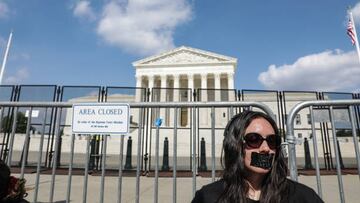What about the states with abortion trigger laws in US?
The reversal of Roe v Wade means that states can now ban abortion and more that half are expected to introduce new restrictions in the coming weeks.


Friday’s announcement that the Supreme Court is reversing the precedent set in Roe v Wade has turned the issue of abortion rights over to the states for the first time in half a century.
The constitutional protections for abortion afforded by Roe v Wade have been removed and states can now move to ban the procedure. The Guttmacher Institute anticipates that a total of 26 states are likely to impose new restrictions on abortion and even ban it entirely.
There are 13 states that have so-called ‘trigger laws’ on the books, which were designed to introduce new laws restricting abortion as soon as Roe v Wade was overturned. However in practice it could take some time, even if only a matter of days, for the laws to go into effect.
Demonstrators have gathered outside the county courthouse in Laramie, Wyoming this evening in protest of today’s SCOTUS decision. Wyoming is one of the states with an abortion trigger law. pic.twitter.com/sLC67JKa1p
— Tony Webster (@webster) June 25, 2022
Which states have abortion trigger laws?
In three states abortion is now illegal in almost all cases after instantaneous trigger bans were enacted today: South Dakota, Louisiana and Kentucky. Abortion clinics in these states will be forced to close and anyone involved in the procedure taking place in those states could face criminal charges.
There are a further ten states with trigger laws that require some action - typically on the part of the governor, attorney general or state legislature – before the ban comes into effect. In some places there is a 30-day delay before the new law will take effect, but in each of these states the eventual outcome is already decided.
The full list of states with abortion trigger bans is Arkansas, Idaho, Kentucky, Louisiana, Mississippi, Missouri, North Dakota, Oklahoma, South Dakota, Tennessee, Texas, Utah and Wyoming.
Within minutes of the Dobbs decision coming out, @AGEricSchmitt issued an opinion that makes Missouri's trigger law go into effect. The trigger law bans abortions except for medical emergencies if Roe is overturned. There are no exceptions for rape or incest. pic.twitter.com/CVq8YlDj47
— Jason Rosenbaum (@jrosenbaum) June 24, 2022
Which states have pre-existing anti-abortion laws?
As well as those with trigger laws, a number of states still have anti-abortion legislation on the books that remain from the pre-Roe v Wade era. In many cases a state’s abortion ban became unusable due to the 1973 ruling but it was never formally removed from state law.
In theory this means that the law, now that Roe v Wade is no longer in place, will become enforceable again. However in practice there will likely be court challenges to attempts to enforce a law that has set dormant for nearly half a century.
The Supreme Court has ended constitutional protections for abortion, and 13 states already have laws that ban abortion in the event of Roe v. Wade being overturned. Another half-dozen states have near-total bans or prohibitions after 6 weeks of pregnancy. https://t.co/VTLTK7zLWk pic.twitter.com/fwMM2CEOzB
— The Associated Press (@AP) June 24, 2022
The matter will likely be decided in state courts, in a process that legal experts warn could take months in some cases. In the meantime, abortion rights will remain.
The states with pre-existing abortion bans are Alabama, Arizona, Arkansas, Michigan, Mississippi, Oklahoma and Texas.
Which states are likely to make abortion illegal?
Related stories
To complete the list of 26 states where abortion could soon be illegal, these four states are judged by the Guttmacher Institute to have the “political composition, history and other indicators—such as recent actions to limit access to abortion” which suggest they will follow suit.
They expect Florida, Indiana, Montana and Nebraska to pass new laws banning or significantly restricting the access to abortion for residents. Indiana, for example, has introduced 55 new restrictions on abortion in the past decade, signalling that the state legislature is eager to curb access to the procedure wherever possible.

